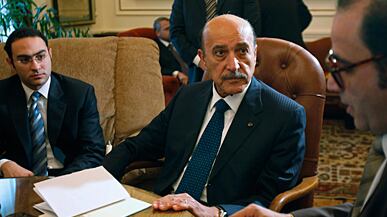Egyptian Vice President Omar Suleiman, the man recently backed by the U.S. to head a post-Mubarak transition, met with members of the Muslim Brotherhood today. It’s a major change from Egypt’s policy—and from its depiction of itself as a bulwark against political Islam. Nevertheless, a spokesman for the Brotherhood, Egypt’s largest opposition group, warned not to expect a change in the organization’s demands. The protests will continue “until the political path can have a role in achieving the aspirations of the protesters,” an apparent reference to the removal of President Hosni Mubarak. The meeting was more about sizing up the other side than negotiating. “The Brothers decided to enter a round of dialogue to determine how serious the officials are about achieving the demands of the people,” said the spokesman. Still, it seems to reflect a region-wide acknowledgement of the Brotherhood’s influence, as King Abdullah II of Jordan met with his country’s branch of the Brotherhood on Thursday.
Read it at The New York Times





